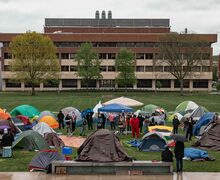Professors help provide a safe environment for students
Corey Henry | Photo Editor
When professors support student movements and defend the voices of students, it helps create a safe learning environment. Lecture halls need to be safe spaces for students in order to facilitate a better learning environment.
Students gain more in having an open dialogue where they can share their experiences with their classmates, bringing them a sense of comfort and solidarity. When professors encourage student voices and support them, students feel more comfortable in the classroom.
A recent example of professor solidarity is the #NotAgainSU movement, a black student-led movement in response to the racially biased incidents that occurred in late November of 2019. During the movement, a seven-day sit-in protest occurred in the Barnes Center. A handful of SU faculty and staff came to the protest offering wise words of encouragement and support, which uplifted students’ spirits.
As a student myself, I would have been more inclined to attend my classes during that chaotic time if I knew my professors were supportive of the movement. When professors acknowledged the movement and the racially biased incidents, there was a feeling of comfort and eagerness to attend class, because their classroom felt safe.
Communication between students and professors is important toward starting necessary conversations. Sara Burke, an assistant professor of psychology, and Luvell Anderson, a sociology professor at SU, said they first heard about the movement through their students.
“I had a conversation with my undergraduate class a week before Thanksgiving break, it was a nice outlet for feelings, like there was some form of dialogue going on,” Burke said. She used her expertise in bias and discrimination to provide her students with more knowledge and context about the hate crimes.
“When people who have high profile decisions — like professors but also administrators — are sending signals that say they are receptive to efforts to improve the climate, or that they are opposed to prejudice… it is really important,” she said. “It can make people who are subjected to prejudice feel more welcome and can reduce the overall total bias incidents.”
Small acts of having classroom discussions can help comfort students at a time of crisis. Having leaders at institutions speak up and send transparent communication about efforts help students feel safe and condemn the perpetrators of these vicious acts.
Professor Anderson discussed his responsibility as a professor to comfort students during difficult times on campus.
“These kinds of events can be very jarring, scary, infuriating, and anxiety-inducing. I see myself as one who is in a position to help students begin to process thoughts around these events and the broader sociocultural contexts in which they occur,” Anderson said.
“I think faculty members ought to be supportive of movements like #NotAgainSU because they display the kind of agency many of us long for our students to embrace,” he said.
Working together as a community of students and faculty helps to combat the difficulties and emotions that come with racially biased incidents. Professors at every college should create classrooms that comfort all students, providing necessary direction toward positive change.
Feryal Nawaz is a junior political science major. Her column appears bi-weekly. She can be reached at [email protected]. She can be followed on Twitter @feryal_nawaz.
Published on January 14, 2020 at 11:18 pm




